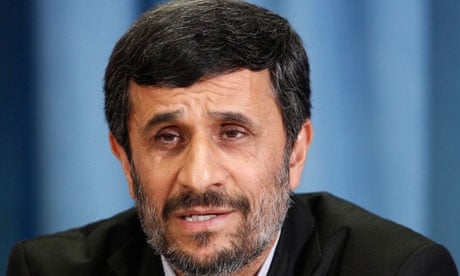Iranian president Mahmoud Ahmadinejad has suffered a major setback after his supporters fared badly in Iranian parliamentary elections.
Supporters of the populist president were relegated to a small fraction of the parliament, hugely outnumbered by the conservatives closely linked with the supreme leader Ayatollah Ali Khamenei.
Results announced by the Interior Ministry showed the United Principilist Front, closely linked with Khamenei and critical of Ahmadinejad, in the lead, with the hardline Resistance Front of the Islamic Revolution close behind.
The Resistance Front also backs Khamenei but some of its members have served under Ahmadinejad and still support him.
Of 65 seats for grabs in Friday's runoff election, Ahmadinejad's final results are expected later on Saturday.
As in the first round, parties directly aligned with Ahmadinejad did not fare well. His opponents won 20 while the president's supporters won only eight seats. Independents had a strong showing, winning 11 seats so far, which may help the president in what is expected to be a tough final year in office.
Results for the rest, including the capital Tehran are expected later on Saturday. About nine Ahmadinejad supporters are likely to win seats in Tehran where they were in a neck-and-neck race. The president's opponents are almost certain to win the remaining 16 seats.
The conservatives had previously backed Ahmadinejad, but then turned against him after he was perceived to challenge the authority of senior clerics. His allies are likely to be ousted from key posts, and his economic policies challenged.
Ahmadinejad's opponents had already won an outright majority in the 290-member legislature in the first round of voting in March.
Iran's major reformist parties, who oppose both Ahmadinejad and the conservatives, mostly did not field candidates. The new parliament will begin its sessions in late May. It has no direct control over major policy matters such as Iran's nuclear programme, but it can influence the runup to the election of Ahmadinejad's successor in 2013.
Iran has touted the turnout for Friday's elections as a show of support for the country's religious leadership in their confrontation with the west over Tehran's controversial nuclear programme.
"Mass turnout in runoff parliamentary elections," declared a front-page headline in the government-run Iran Daily.
"The vote is support for the ruling system as it faces the US and its allies over the nuclear programme ... The vote also means that tensions will increase between Ahmadinejad and his opponents in the incoming parliament," said political analyst Ali Reza Khamesian.
Ahmadinejad saw his political fortunes decline sharply after he was perceived to have defied Khamenei in April 2011 over the appointment of an intelligence chief and trying to expand the authority of the presidency.
